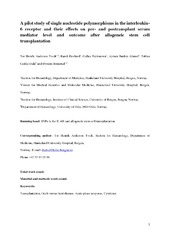A pilot study of single nucleotide polymorphisms in the interleukin-6 receptor and their effects on pre- and post-transplant serum mediator level and outcome after allogeneic stem cell transplantation
Tvedt, Tor Henrik Anderson; Hovland, Randi; Tsykunova, Galina; Ahmed, Aymen B; Gedde-Dahl, Thobias; Bruserud, Øyvind
Peer reviewed, Journal article
Accepted version

View/
Date
2018-07Metadata
Show full item recordCollections
Original version
https://doi.org/10.1111/cei.13124Abstract
Interleukin (IL)‐6 is an important regulator of immunity and inflammation in many diseases. Single nucleotide polymorphisms (SNPs) in the IL‐6 gene influence outcome after allogeneic stem cell transplantation (ASCT), but the possible importance of SNPs in the IL‐6 receptor has not been examined. We therefore investigated whether SNPs in the IL‐6R gene influenced biochemical characteristics and clinical outcomes after ASCT. We examined the IL‐6 promoter variant rs1800975 and the IL‐6R SNPs rs4453032, rs2228145, rs4129267, rs4845374, rs4329505, rs4845617, rs12083537, rs4845618, rs6698040 and rs4379670 in a 101 population‐based cohort of allotransplant recipients and their family donors. Patients being homozygous for the major alleles of the IL‐6R SNPs rs2228145 and rs4845618 showed high pretransplant CRP serum levels together with decreased sIL‐6R levels; the decreased IL‐6R levels persisted 6 months post‐transplant. In contrast, patients being homozygous for the minor allele of the IL‐6R SNP rs4379670 showed decreased pretransplant CRP levels. Furthermore, the IL‐6R rs4845618 donor genotype showed an association with severe acute graft‐versus‐host disease (GVHD), whereas the donor genotype of the IL‐6 SNP rs1800795 was associated with decreased survival 100 days post‐transplant. Finally, the recipient genotype of the IL‐6R SNP rs4329505 showed a strong association with 2‐years non‐relapse mortality, and this effect was also highly significant in multivariate analysis. IL‐6 and IL‐6R SNPs influence the clinical outcome after allogeneic stem cell transplantation.